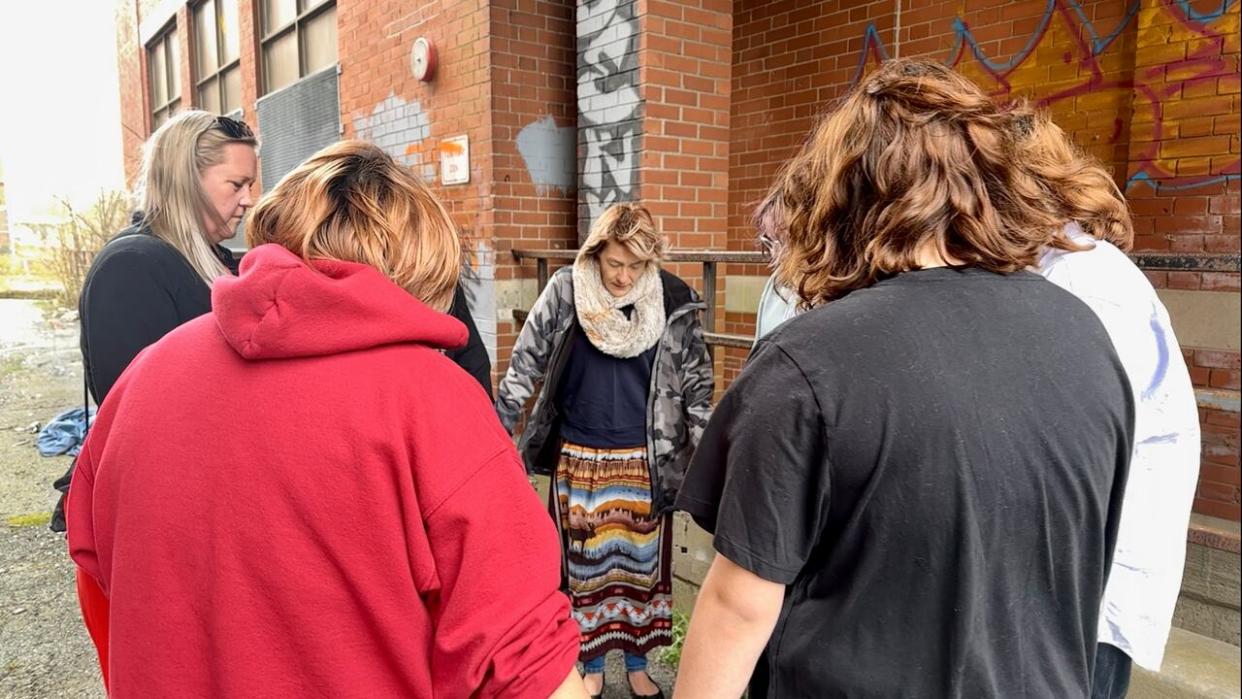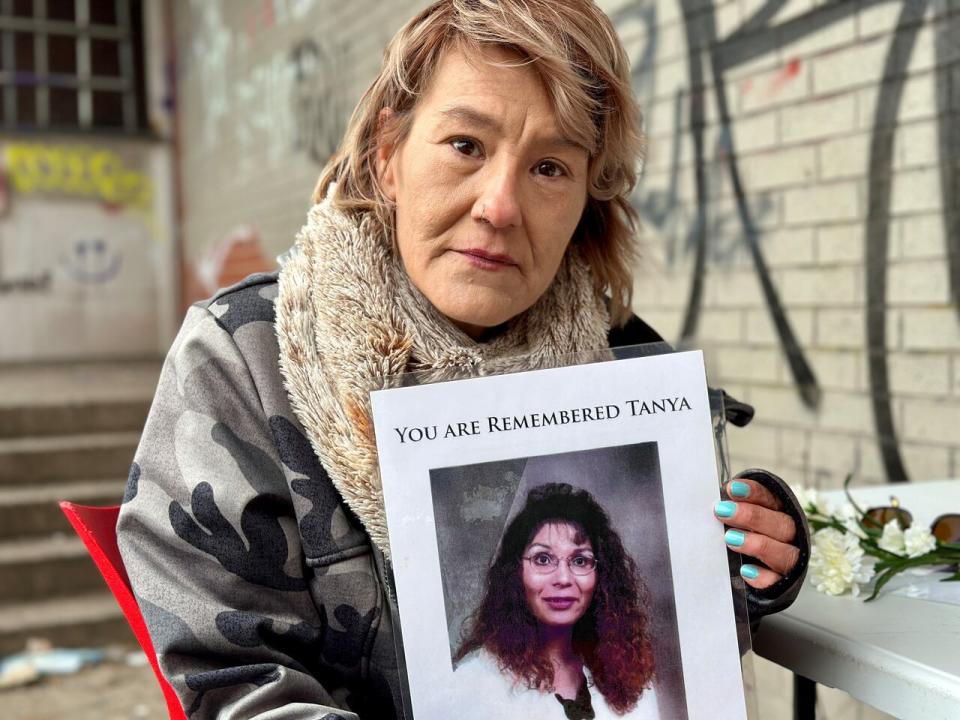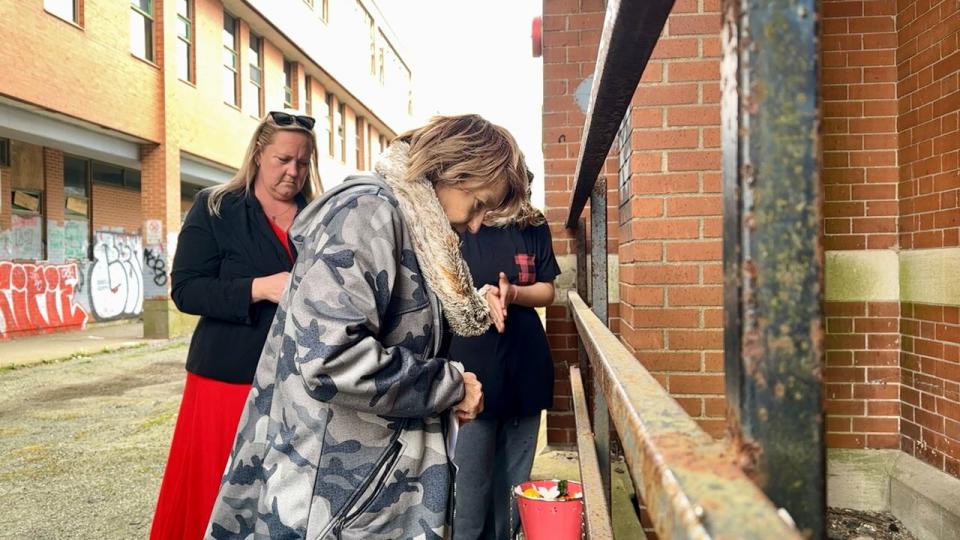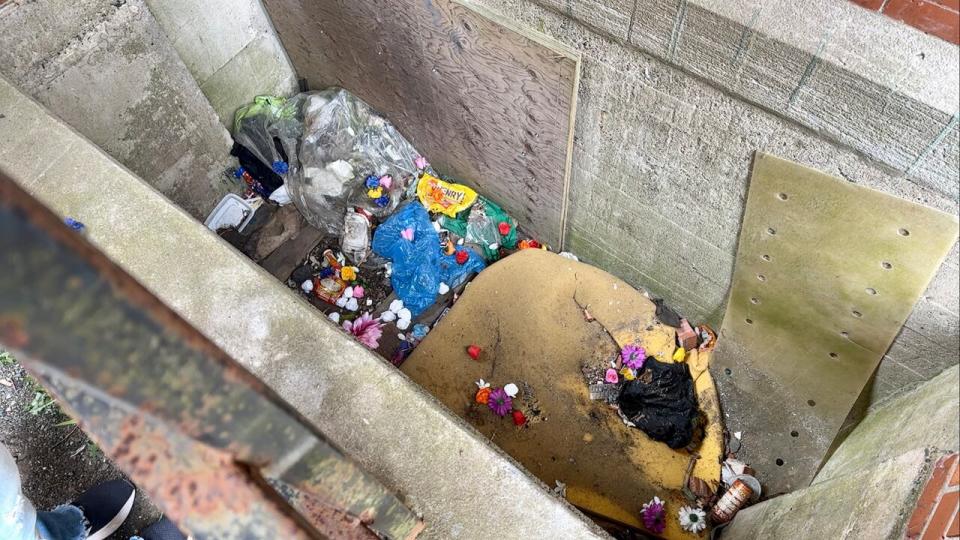'Her life mattered': Tanya Brooks's family fights to keep her memory alive

A boarded-up and vandalized old school is not a typical site for a memorial, but it's where Vanessa Brooks has come every year to honour her late sister for a decade and a half.
St. Pat's-Alexandra School in Halifax's north end is now closed and the site is marked for redevelopment, but the school was in operation 15 years ago. Students were ferried out on the afternoon of Monday, May 11, 2009, after a body was discovered in a window well.
It was 36-year-old Tanya Brooks. She was last seen alive the night before, walking hastily toward the school.
Vanessa and a small group of family and friends gathered outside the derelict building this year to throw plastic flowers into the window well, sing, embrace and cry as they remembered Tanya and marked the sombre anniversary.
Vanessa said it's painful to return to the site, but she feels it's essential.
"It has to count," she said. "It has to matter because her life mattered."

Vanessa Brooks holds a picture of her sister, Tanya Brooks, on the 15th anniversary of her death. (Taryn Grant/CBC)
Police call Tanya's death a homicide, but there has never been a charge in the case. They're still investigating.
Vanessa doesn't think it would take much to solve the case.
"You could end my headache and my heartache and give the closure to our families if somebody just opens their mouth," she said. "We just need people to come forward."
Tanya was a mother of five. She would be a grandmother today.
A Mi'kmaw woman originally from Millbrook First Nation, Tanya was living in Halifax at the time of her death. She was homeless, addicted to drugs and alcohol, and working in the sex trade.
Vanessa said her sister was much more than her vices and didn't deserve to pay for them with her life.
"She was kind-hearted," she said. "She was a very, very talented artist. She was a proud mom.
"She may have made choices and decisions that necessarily don't align with mainstream, but we all have choices and decisions that don't align with mainstream. I don't think that that constitutes for murder."
Generations of people marked by loss
Vanessa described her sister's absence as having a "butterfly effect" – touching countless people across generations, including their parents, Tanya's siblings, children, nieces and nephews, and now her grandchildren.
For Vanessa, the heartbreak of Tanya's death accelerated the death of their mother, Connie Brooks, who died in 2015. Vanessa said it played a role in the death by suicide of one of Tanya's sons about five years ago.

Vanessa Brooks stands at the edge of the window well where the body of her sister, Tanya Brooks, was found on May 11, 2009. (Taryn Grant/CBC)
Cheryl Maloney agreed that Tanya's death is a far-reaching trauma, but she said Tanya's love for her family is another important part of her legacy.
Maloney, a past president of the Native Women's Association of Nova Scotia and an advocate for missing and murdered Indigenous women and girls (MMIWG), said her family and the Brooks family are connected through marriage.
Maloney recently met one of Tanya's grandchildren, an infant boy.
"She would have been there with me, holding that baby. And he loved me, came to me, he talked to me. And that is what she's missing. That's what people need to hear about," Maloney said in a phone interview.
Missing and murdered
She said she worries some may think the problem of MMIWG was resolved when the National Inquiry into Missing and Murdered Indigenous Women and Girls wrapped five years ago.
"It's been quiet because government tied things up," she said.
But she said that isn't the end of the story.
"I think it's important to have these walks and memorials and not forget," she said.
The national inquiry concluded in June 2019 with a report that included 219 calls for justice – legally mandated directives to stop violence against Indigenous women, girls and two-spirit people.
A CBC analysis last year found that just two of those directives had been completed, and more than half had not been started.
Vanessa Brooks said she was skeptical of the inquiry when it began, and her skepticism has been validated.
Empty promises
"I was always afraid it was just going to turn out to be … a bunch of empty promises. And where are we sitting? We're sitting with more questions, not enough answers and definitely not the resources that we need."
She said the pandemic caused a lapse in support from Ottawa for the families of victims, and she hasn't yet seen those services fully rebound.

The window well where Tanya Brooks's body was found on May 11, 2009. Loved ones threw in plastic flowers on the 15th anniversary of her death. (Taryn Grant/CBC)
Halifax Regional Police issued a news release Friday to urge anyone with information about Tanya Brooks's death to share it.
"Investigators believe Tanya knew her assailant(s) and that there are people who have information that could help solve her murder," the release said.
"We hope that the passage of time will encourage them to do the right thing and come forward with what they know.
"It is never too late to come forward and the smallest piece of information may be just what is needed to progress the investigation."
The homicide is part of the province's major unsolved crimes program, which offers an award of up to $150,000 for information that leads to an arrest and conviction.
MORE TOP STORIES

